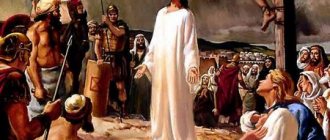For the beginning Christian
Published 03.11.2017
What does “Jesus Christ” mean? Many people believe that Jesus Christ is a first name (Jesus) and a last name (Christ). The question is actually very simple, but many still do not know the correct answer to it.
Names of Jesus Christ
Jesus is a modern Church Slavonic transliteration of the Greek form Ιησούς of the Hebrew name ישוע (pronounced “Yeshua”), which is a truncation of the name יהושוע Yehoshua, consisting of the roots of the words “Yehovah” - the name of God in the Old Testament and “shua” - salvation.
Christ is an epithet indicating the nature of the mission of Jesus from a Christian point of view. The Greek word Χριστός is a translation of the Hebrew משׁיח (Mashiʁah) and the Aramaic משיחא (Meshiʁkha) (Russian transliteration - messiah) and means “anointed one.”
Origin and meaning of the name Jesus
The fact that Jesus received His name from God Himself
21 She will give birth to a Son, and you will call His name Jesus, for He will save His people from their sins. (Matt. 1:21) 9 Therefore God also highly exalted Him and gave Him the name that is above every name (Phil. 2:9)
testifies of Him as God-appointed Ruler of the world,
10 So that at the name of Jesus every knee should bow, in heaven and on earth and under the earth (Phil. 2:10)
Who is endowed with divine power, yet reigns in obedience to God, being accountable to Him.
28 When all things are put in subjection to Him, then the Son Himself also will be subjected to Him who put all things in subjection to Him, so that God may be all in all. (1 Cor. 15:28)
In this name a person can find and recognize God.
Therefore M. Luther says: “You ask, who is He? His name is Jesus Christ, the Lord of Hosts, and there is no other God.”
The Good Shepherd (John 10:11)
This “name” appears most often in the scriptures. Christ is compared to a caring shepherd who leads His sheep with a gentle but firm hand. He cares about them so much that he is willing to sacrifice his life out of love for them (that is, for us). Through the Prophet Ezekiel, Jesus gave us this great promise: “As a shepherd looks after his flock on the day when he is among his flock that is scattered, so I will look over my sheep and deliver them from all the places where they were scattered on a cloudy and dark day. . And I will bring them out from among the nations, and gather them from the countries, and bring them into their own land, and I will feed them on the mountains of Israel, and by the streams, and in all the inhabited places of the land. I will feed them in good pasture, and their fold will be on the high mountains of Israel; there they will rest in a good fold and feed in rich pasture on the mountains of Israel. I will feed my sheep, and I will give them rest, says the Lord God. I will find the lost, and bring back the stolen, and bind up the wounded, and strengthen the sick... I will feed them with righteousness” (Ezekiel 34: 12-16).
The Great Shepherd truly knows His children by name and gathers them together to “shepherd them in righteousness.”
I am
Jesus talks about Himself
When Jesus speaks about Himself, He seeks to say that there is no other God.
His speeches about Himself, beginning with “I am” [Greek. ego eimi] , testify to Him as God's revelation.
He is like the “bread of life” (John 6:35,51) given to man by God for eternal life. As “the light of the world” (John 8:12), Jesus calls people to come out of the darkness of sin and find the way to life in His light. Calling Himself “the door” (John 10:9) and also “the way and the truth and the life” (John 14:6)
Jesus shows that only through Him can one come to the truth in which a person finds eternal life. Since death, which is the consequence of sin, blocks the path to life, Jesus is also “the resurrection and the life” (John 11:25); in other words, faith in Jesus leads to God, to the only one from whom and through whom a person can receive life and abide in it.
Therefore, Jesus declares His uniqueness:
- He is the “good shepherd” (John 10:12,14), without whom those who belong to Him, whom He calls “his own,” cannot live.
- They are inseparably connected with Him, as a grape branch is connected with the “true Vine” (John 15:1,5).
In John 8:24,28 Jesus speaks of Himself personally: “It is I” [Greek: ego eimi] (cf. Mark 14:62) and thus recalls God's revelation to Moses in Exodus 3:14; The Septuagint translates God's words “I am who I am” as “it is I” (ego eimi).
Just as God strives to make His name clear to Moses, so Jesus says of Himself that He is the final, exclusive revelation of God (Heb. 1:1ff.) and that only in Him does God grant His salvation to people (Acts 4:12).
Son of Man
What is more difficult to understand is why Jesus calls himself the “Son of Man” [Heb. ben haadam; aram. bar-enash; Greek go guyos tu antropu] :
son of man
- the phrase ben haadam in the Synodal Translation of the Old Testament is most often rendered as “son of man” (Job 25:6; Ps 8:5; 35:8; 89:4; Eze 2:1; 3:17, etc.). In these verses the expression “son of man” is identical with the concept of man;
- only in Dan 7:13 and the following the expression “Son of man” designates the coming ruler of the Kingdom of God (Messiah): “One like the Son of man came with the clouds of heaven.” He is contrasted here with the four beasts who embody the great kingdoms of the earth (vv. 3-8). In a similar meaning, this expression is found in the Book of Enoch, preserved only in the Ethiopian language, where the Son of Man is called chosen and righteous;
Son of Man
Calling Himself the Son of Man in the Gospels (70 times in the Synoptics, and 12 times in John), Jesus relies on Dan 7:13. Besides Jesus Himself, only Stephen (Acts 7:56) and John (Rev 1:13; 14:14) call Him this way.
In Dan 7 the Son of Man is clearly understood as a heavenly figure.
In the Gospels, the Son of Man is the exclusive self-designation of Jesus; This expression never appears in the address or narrative of Jesus. Many answers have been offered to the question about the meaning of this name.
By calling himself the Son of Man, Jesus meant that His appearance was no different from the appearance of other people or that the true man was revealed in Him, the man that God wanted him to be when he created him.
Comparison of Adam and Christ: Adam, a Type of Christ
For the Jews, the concepts of “Son of Man” and “Christ” (=Messiah) were closely connected,
34 The people answered him: We have heard from the law that Christ abides forever; How then do You say that the Son of Man must be lifted up? Who is this Son of Man? (John 12:34)
and the words of Jesus that He was the Son of Man were perceived by them as blasphemy (Mark 14:62-64).
In accordance with this, later exegetes categorically and, indignantly, rightly say that the phrase “Son of Man” is “the most pretentious self-definition that a resident of the ancient East could have used” (Stauffer, Theologie des NT).
The sayings of Jesus that contain the expression “Son of Man” can be divided into three groups:
- a) the identity of the Son of Man and Jesus (Mark 2:10; John 1:51),
- b) His suffering (Mark 8:31; 9:9,31; 10:33 et par.; Matt. 26:2; John 8:28),
- c) His appearance as ruler and judge (Mark 8:38; 13:26 et al.; John 5:27).
Bread of Life (John 6:35)
Bread is an important part of our diet. In Russia, bread is present on the table at almost every meal. It was the same in ancient Israel. Bread was the basis of everything. But when Jesus compared himself to bread, He was teaching a higher law. Amos 8:11 says, “Behold, the days are coming, says the Lord God, when I will send a famine in the land—not a famine of bread, nor a thirst for water, but a thirst for hearing the words of the Lord.” Christ meets our physical needs, but He takes care of our spiritual needs first. No wonder He introduced the sacrament of communion with bread in memory of His tormented body. Only He holds the keys to eternal life, and only He can truly “satisfy” us – “For the bread of God is that which comes down from heaven and gives life to the world” (John 6:33).
God's Son
God's revelation in Jesus
If so far we have been talking exclusively about the statements of Jesus Himself, then the expression “Son of God” is both a self-designation of Jesus and a human confession of God’s revelation in Jesus:
1. in the Old Testament, the concept of “son” in relation to God is not assigned exclusively to the Messiah: God could call the people of Israel this way (Ex 4:22; Deut 14:1; 32:6,18; Jer 31:9; Hos 11: 1). True, such passages in the Bible as Ps 2:7 received a messianic interpretation already from the rabbis;
2. in the New Testament, “Son of God” (singular), as well as simply “Son” is the exclusive messianic designation for Jesus:
- a) God Himself calls Jesus His Son and acknowledges His fatherhood before people (Matthew 3:16,17; 17:5; Luke 9:35);
- b) Jesus recognizes Himself as the Son of God and thereby reveals His origin from God and His special relationship with Him (Matt. 11:27; John 1:14,18; 3:16). Therefore, when He addresses God, He calls Him “Father” and always says “My Father,” but never “Our Father” (in Matthew 6:9; in Luke 11:2 “Our Father” is said on behalf of the disciples and as an instruction for them). The uniqueness of Jesus as the Son of God is emphasized by the definition of “only begotten.” Jesus' recognition of the fact that He is the Son of God ultimately brings Him death (Matthew 26:63ff). When Jesus calls Himself the Son of God, He is claiming absolute headship over all creation (see Col. 1:15ff; also John 1:3). He is pre-eternal, and everything came from Him. Thus, the concept of “Son of God” is equivalent to the concept of “Lord”;
- c) when a person confesses Jesus as the Son of God, he thereby expresses his faith in the revelation revealed in Him (Matthew 16:16), becomes a member of the Church (Acts 8:37) and enters into fellowship with God (1 John 2:23). But only God Himself leads a person to this confession (Matthew 16:17);
- d) even demons recognize Jesus as the Son of God (Matthew 8:29; Mark 3:11; Luke 4:41), and this testifies to His universal power.
Son of David
The expression “son of David” is also the messianic self-designation of Jesus and the formula for recognizing Jesus as the Messiah:
- the promise given to David by God (2 Sam. 7:12ff.) is interpreted as messianic (see Ps. 132:11). It is often repeated by the prophets (see Isa 9:6ff; Jer 23:5; Eze 34:23; Zech 12:8). Therefore, the designation “son of David” is the title of the Messiah.
- In Matthew 22:41-46, Jesus' objection is not to being called the "Son of David" but to the misconception that the Messiah is inferior to David. Even as the “son of David,” the Messiah is David’s Lord, since he comes from God.
Jesus acknowledges this conversion (Matt. 9:27; 21:9), and the Church acknowledges (Matt. 1:1) and confesses Jesus as the Son of God “of the seed of David according to the flesh” (Rom. 1:3).
The title “Son of David” also testifies to the human nature of Jesus and acquires weight only next to the name “Son of God” (see Rom. 1:3ff.).
Only both names together accurately identify Jesus as God's revelation in the flesh.
Messiah (John 4:25)
The name "Messiah" comes from the Aramaic word "mashiʹach", which literally means "anointed one" (see above). But in Judaism, the word also implies a spiritual leader or king. Although the concept "Messiah" is used only twice in the Bible, it has important spiritual meaning. The ancient Jews were waiting for the promised Messiah to save them from the yoke of the Roman Empire. They did not understand that a great King would come to redeem them from the yoke of a greater enemy who was actively working to prevent people from returning back to God. Only a few realized and accepted the true nature of Christ's mission. He is truly the King and leader of those who choose to follow Him and be obedient to His will.
King, High Priest, Prophet
There are many other names that explain the actions of Christ. These are, first of all, designations such as “king”, “high priest”, “prophet”.
Royal title
- Jesus' royal title is closely related to the designation "son of David."
- The wise men (magi) recognize Him as king (Matthew 2:2)
- Jesus Himself acknowledges Himself as king before Pilate (John 18:37).
- His kingdom is of a different kind, it is not like the one that exists in human imagination (John 18:36).
This was the reason for the mockery of the suffering Jesus (Matthew 27:29,37,42). His dominion is hidden (v. 37), known only to believers, and triumphs over sin, death, and the devil.
But this is true dominion over the whole universe (1 Tim. 6:15); now it is known and recognized by faith, and at the end of time it will become obvious to everyone (Matt. 25:34; Rev. 17:14; 19:16).
Thus, the title "king" refers to the Second Coming of Jesus in glory.
Priest and High Priest
Jesus is called a priest and high priest
1. In the Psalms and in the Epistle to the Hebrews, Jesus is called a priest and high priest (Ps 109:4; Heb 5:6; 7:1,3,17,21). The prototype of the reconciliatory and redemptive feat of Jesus was the Old Testament service:
- He Himself, by His sacrifice, once and for all opened people’s access to the Holy of Holies, i.e. to God (Heb. 9:12).
- According to His sinlessness (Heb 4:15; 7:26ff.)
- and His mercy (Heb 2:17; 4:15)
- He stands above all the priests and abides forever (Heb. 10:13);
2. The fact that Jesus sacrifices Himself is emphasized by the designation “Lamb.” In Isaiah 53:7 the lamb is called “the servant of God” (Isaiah III:2a,b), which refers to Jesus Christ, who took away the sin of the world (John 1:29,36).
Passover lamb type of Christ: 14 points
acc. John 19:30,31, Jesus dies at the moment when the Jews slaughter the Passover lamb in the temple.
Therefore, Paul has the right to call Jesus “our Passover” (i.e., “our Passover lamb” - 1 Cor. 5:7), for He died as a righteous sacrifice for the sins of the world (1 Pet. 1:19).
In Revelation, the glorified Jesus appears 29 times as the slain Lamb (Rev 5:6ff; 13:8etc.).
Jesus, as the Lamb who sacrificed Himself for His Church, gives her life and victory (Rev 7:9ff; 12:1ff; 14:1ff). But He Himself conquers the godless and opposing forces to God (Rev 6:16,17; 14:10; 17:14), and at the end of time He will be revealed as the ruler over all creation and will be united forever in marriage with His bride - the Church (Rev 19:7ff; 21), saved from deception by the Antichrist, who takes the form of a Lamb (Rev 13:11).
Messiah
1. Jesus is nowhere called a prophet in the literal sense of the word; on the contrary, His difference from the prophets is emphasized everywhere. The people who take Him for a prophet do not know Him (Mark 6:15; Matthew 16:14). On the other hand, Moses proclaims the Messiah as the coming prophet (Deut. 18:15).
In some cases He is called in the New Testament “that prophet” (John 6:14; cf. also 1:21; 7:52), which is equivalent to the concept of “Messiah.” If Jesus recognizes Himself as a prophet (Luke 13:33), then it is precisely in this sense, broader than that which is encompassed by the actual concept of “prophet.”
In Hebrews 1:1ff. Jesus is contrasted with the prophets and placed above them as the bearer of the final, decisive word of God to man;
2. Therefore, Jesus can also be called “the Word” [Greek. logos] . The difference between Jesus and the prophets is that He does not, like them, carry God’s Word, but He Himself is this Word. Those. the bringer of revelation is equal to the revelation itself.
He is the Word who was in the beginning, and “all things came into being through Him” (John 1:1-3; cf. Gen. 1:1): as the mediator of the creation of the world, He was predestined for everything created. But as the bearer of revelation, He began to dwell among people, becoming equal to them (John 1:14) and turning into a mediator of life (1 John 1:1).
Ultimately, Jesus, as the victorious Word of God, overcomes his enemies (Rev 19:13).
Other Names
Along with the above, there are also less common names:
The name of God in the Bible. More than 55 options.
- based on Isaiah 7:14, Jesus is called “Immanuel” , since the concept “God with us” becomes a visible reality in Him;
- the expression “lion of the tribe of Judah” (Rev 5:5) recalls Genesis 49:9 and speaks of the invincibility of Jesus;
- in 2 Peter 1:19; Rev 22:16 Jesus is called the “morning star” because perfection comes in Him;
- “the Bridegroom” only in parables (Matthew 9:15; 25:1; John 3:29), in which His Church is metaphorically represented, filled with great joy from communicating with Him;
- "Branch" is the name of the Messiah in Jeremiah 23:5; 33:15; Zechariah 3:8; 6:12, which speaks of Christ as the branch of David. Being “a branch from the root of Jesse” (Isaiah 11:1) and the Son of God, “who was born of the seed of David according to the flesh” (Rom. 1:3), He is revealed in His earthly life as the King of kings and Lord of lords. The designation “My servant, the Branch” (Zec 3:8) refers to the humiliation of the Messiah and His obedience to the point of death (Isa 52:13 - 53:12; Phil 2:5-8). The name "Branch" (Zechariah 6:12ff.) traces a connection with the Son of Man as the "last Adam" and the "second man" (1 Cor. 15:45-47), who, being both priest and king, rules the world; inheritance - once given to Adam, but lost by him as a result of the Fall.
Judge of the living and the dead (Acts 10:42)
Jesus was the first to be resurrected, never to die again. He overcame physical death for each of us. Because of His sacrifice, we can all rise from the dead. After the resurrection, we will appear in eternal judgment, where we will be judged for the deeds we have done on earth. He is truly the judge of both the living and the dead. The atoning sacrifice of Christ was offered not only for those who lived on earth when He was here in the flesh, but also for those who were born after His death, as well as for those who died long before Him. He came to earth to literally suffer for all mankind, and we will all be responsible for accepting His sacrifice for each of us: “They will give an answer to Him who will quickly judge the living and the dead” (1 Peter 4:5).
In the name of Jesus
The Church, preaching and acting in faith, does this “in the name of Jesus.”
This phrase in no way represents a formula, like those used in magic and sorcery. The commandment warns of the danger of such abuse (Exodus 20:7).
To be baptized “in the name of Jesus” (Matt 28:19; Acts 2:38; 8:16) means to connect your life with Jesus through faith (Rom 6:3-6; Gal 3:26 et seq.). The words “in the name of Jesus” should also be understood in other cases.
To act “in the name of Jesus” means to act “by the power and authority of Jesus.” Diseases recede “in the name of Jesus Christ,” i.e. before His power (Acts 3:6; 4:10); sins are forgiven “for His name’s sake,” i.e. Himself (1 John 2:12).
And demons obey those who exercised the authority given by Jesus (Luke 10:17; Acts 16:18).
Finally, the Church also prays in the name of Jesus Christ (John 14:13; 15:16; 16:23), i.e. by His Spirit; through Him she has access to God and gives thanks in the name of Jesus Christ (Eph 5:20).
Everything that happens in the Church must be done “in the name of Jesus Christ” (Col. 3:17).
Advocate with the Father (1 John 2:1)
In his letter, John teaches that when we sin, Jesus will intercede or plead for us with the Father. Christ paid for all our sins. This does not mean that we now have nothing to do, but even our constant efforts are not enough to overcome the bonds of sin, because we all make mistakes and stumble. This is why Jesus came to earth and endured all the suffering. He Himself taught that no one can come to the Father except through Him (John 14:6). He will be the mediator (or "Reconciler" - Genesis 49:10) between mercy and justice for the sake of each of His children.
Redeemer
Why is this legendary prophet and God-man called the Redeemer? A word with this meaning is present in Hebrew, it sounds like “goel”. The Law of Moses provided for the possibility of redemption of the estate by the debtor's closest relative from creditors. In addition, the “goel” had the right to kill anyone who dared to take the life of his relative. Of course, this approach had nothing in common with Jesus and his teaching.
If we draw a parallel with the Law of Moses, a simple fact becomes obvious: Jesus redeemed the lost grace with his own blood and suffering. The Redeemer came into the world for the sole purpose of restoring the balance of power. What the Son of God did by crucifying himself on the cross dealt a serious blow to Satan and gave us all hope of salvation.
Why did Christ appear?
You have all heard the phrase: “The Lord is salvation.” Why do they say that, what does it mean? When creating the Son, the All-Good Lord endowed him with a piece of his power. Once upon a time, people resisted the divine will - the Fall happened, and we all became mortal. Since the expulsion of the first people from Eden, sins have continuously accumulated. Humanity could no longer produce holy prophets—the situation needed urgent correction.
Theologians name only one way to restore balance - sending the Savior to the people. Christ lived among ordinary Israelites and preached the word of his Father. Many received healing in Christ, great truths were revealed to them. It turns out that the Savior appeared to help us all. And for the same purpose he sacrificed himself on the cross.











